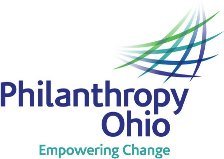Posts filed under ‘philanthropy forward’
Why racial equity?
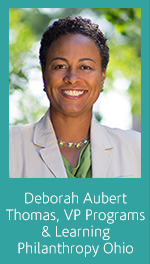 Philanthropy Ohio has adopted diversity, equity and inclusion (DEI) as a core value, declaring:
Philanthropy Ohio has adopted diversity, equity and inclusion (DEI) as a core value, declaring:
We believe that greater diversity, equity and inclusion is a matter of fairness and effectiveness in our profession. To have real impact in a diverse and complex world, organized philanthropy must effectively include these voices and draw upon them to intentionally engage issues of diversity, equity and inclusion in an authentic way. We encourage all foundation leaders to sustain leadership commitment, authorization, learning and outreach and strategically and intentionally advance diversity, equity and inclusion in our organizations and grantmaking.
As an organization, we acknowledge all issues of equity – gender equity, economic equity, health equity, etc. – are of importance and have decided to lead with racial equity and address its intersectionality with other forms of equity.
We recognize that our members may fall along a spectrum on the path to addressing racial equity, from Awareness of Inequity through Understanding Why Inequity Exists to Transforming Toward Equity (see chart below from Forward Through Ferguson).
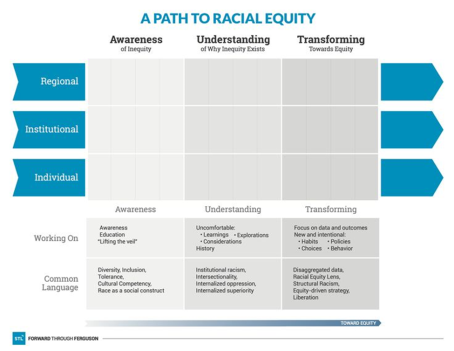
We place our current equity programming between the Awareness and the Understanding positions: to be Aware of race as a social construct and to understand why inequity exists.
At Philanthropy Forward ’17 last October, Dr. Eddie S. Glaude Jr. (Chair, Center for African American Studies at Princeton University) gave our keynote address, “The Value Gap,” which refers to the values that contribute to institutional racism – that white people are valued more than others are. He challenged philanthropy to be in a continual “crisis of racial awareness” as we do our work: to understand what some have to deal with every single day and to confront the ugliness of our history and how we got to now.
The learning, explorations and considerations that are part of the Understanding position can be uncomfortable and we need to lean into that discomfort. To quote Tamara Copeland, Washington Regional Association of Grantmakers president, “Racism cannot be explored in sound bites. There is a depth and breadth to the topic that requires that you listen, reflect, talk with others and then sit with the information for a while to make it your own. It is hard work to truly understand racism.”
Philanthropy Ohio is offering workshops and discussions that will further our individual and collective journeys from awareness through understanding to transformation. We are asking our members, as they engage in this work to reflect on what they are sitting with at any moment – be it hope, apprehension, discomfort or encouragement. And be open to having honest and courageous conversations with peers and in our communities. It is imperative that together we consider if and how philanthropy can shift.
Putting Racism on the Table, developed by the Washington Regional Association of Grantmakers, is a six-part video and discussion series examining how race-based preconceptions and actions – whether conscious or unconscious – can shape the effectiveness of philanthropy committed to issues as varied as education, housing, the arts or health care. The series has two cohorts, one for philanthropy CEOs and trustees and the other for program and other staff. The series runs February through July in Cleveland and May through October in Cincinnati with the Central Ohio series yet to be set.
Putting Racism on the Table for Program & Other Staff – May 14
Putting Racism on the Table for CEOs & Trustees – May 14
The Racial Equity Institute’s Groundwater and Phase I trainings are intensive presentations on historical, institutional and systemic racism challenging deeply-held assumptions and revealing the devastating impacts of persistent racial inequality on our nation’s most marginalized populations. According to the Racial Equity Institute, race remains an important indicator of well-being in U.S. society. When other factors, cited as the probable reasons for health or social problems (e.g., income, education, parent involvement, access to health insurance, etc.), are controlled for by statistical analyses, race remains an important, independent predictor of health, social, education, criminal justice and other outcomes.
Participating in these learning opportunities can help prepare philanthropy to be a platform for societal change that goes well beyond financial support.
Racial Equity Workshop – Phase I – May 3 – 4
Racial Equity Workshop – Phase I – May 7 – 8
In order to move to Transforming Towards Equity, we must embrace Dr. Glaude’s challenge to change the frame and invest in the solutions and not the problems. He asserts that we must understand that what we are doing is not charity; it is justice work. And we must not believe that equality is something we have to give.
Deborah Aubert Thomas
February 23, 2018 at 12:38 pm Philanthropy Ohio Leave a comment
Another great Philanthropy Forward conference
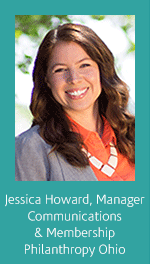 October 4 – 6, we hosted nearly 300 philanthropy professionals in Cleveland for Philanthropy Forward ’17. The conference was three days of plenary speakers who challenged, members connecting with each other and breakout sessions that imparted tangible takeaways. One of the main themes this year was the future of the sector – where we are heading and where we should be heading.
October 4 – 6, we hosted nearly 300 philanthropy professionals in Cleveland for Philanthropy Forward ’17. The conference was three days of plenary speakers who challenged, members connecting with each other and breakout sessions that imparted tangible takeaways. One of the main themes this year was the future of the sector – where we are heading and where we should be heading.
The conference kicked off with three learning tours that gave attendees the chance to experience Cleveland and see the work of local funders. They were the Why Parks Matter tour of several city parks; Social Enterprise tour of four entrepreneurial social purpose businesses; and a private tour of Playhouse Square, the largest theater restoration project in the world.

Upcycle Parts is a social enterprise that hosts craft-making events from donated supplies.
After a fun Ohio Roots Home Grown Welcome Party at Great Lakes Brewing Company (and accompanying retirement send off for Brian Frederick), Phil Buchanan, Center for Effective Philanthropy (CEP) president, opened the conference with his plenary “Leading Effective Organizations in Complex, Changing Times.”
CEP surveyed foundation CEOs earlier this year about whether the current political climate is affecting their grantmaking and programmatic goals. Phil shared that:
- 48% of foundations see a negative effect of the new administration on their work, while 3% see a positive effect
- 34% are changing their grantmaking budget, either increasing it (14%) or changing the allocations (20%)
- 46% are putting more emphasis on collaborating with other funders
- 45% are advocating more at the state level, 43% at the local level
- 52% said the sheer magnitude and complexity of the problems on which their foundations are focused, plus the current political/economic climate makes progress difficult
- 30% see the lack of collaboration as a barrier to progress
- 64% are taking more risk

Plenary speaker Phil Buchanan is president for the Center for Effective Philanthropy.
At the Annual Meeting, we introduced five new members to the Board of Trustees and welcomed four back for additional terms of service:
- Susan Urano, The Athens County Foundation
- Connie Hawk, Licking County Foundation
- Holly Fowler Martens, The Char and Chuck Fowler Family Foundation
- Ted Vander Roest, Springfield Foundation
- Keith Burwell, Toledo Community Foundation
- Brady Groves, Richland County Foundation
- Margaret Hulbert, United Way of Greater Cincinnati
- Lissy Rand, Deaconess Foundation
- Karen White, KeyBank Foundation
The lunch plenary speaker Dr. Eddie S. Glaude, Jr., author and Princeton professor, challenged attendees to recognize and address the Value Gap – the belief the white people matter more than others. In his talk, “The Value Gap: A Challenge to Equity,” he showed how this belief continues to shape society and limits the scope of change.

Dr. Eddie S. Glaude, Jr., author and Princeton Professor of Religion and African American Studies and Chair, Center for African American Studies, was the lunch plenary speaker.
Glaude also touched on unconscious bias, which gives us a pass because unconscious implies that we don’t know our biases exist. He suggested we should call them habits, because we carry them with us. However, unlike bias, we can change our habits, but only by confronting the Value Gap and the ugliness of our history. We have to be consciously aware of what people have to deal with every day.
We also showed the documentary 13th and had a discussion following, keeping the conversation flowing around race and equity in America.
See tweets and reactions to Philanthropy Forward ’17 on Storify.
Throughout the conference, four philanthropists received awards for outstanding achievements in philanthropy. Click here to read more about the award winners: Ohio Philanthropy Award winner Hank Doll; Emerging Ohio Philanthropist Anthony Richardson; Michael G. Shinn Award for Diversity, Equity and Inclusion in Philanthropy winner Treye Johnson; and Innovation Award winner Don Ambrose.
The Final plenary speaker was futurist Trista Harris who shared signals for the future and what’s next for philanthropy in her speech “The Future of Philanthropy.” Harris suggested spending two hours per week thinking about the future and looking for solutions to your problems outside the sector.

Trista Harris is a futurist and president of the Minnesota Council on Foundations.
A panel of grantmakers from the Sisters of Charity Foundation of Cleveland, Greater Cincinnati Foundation and the George Gund Foundation spoke about taking risks and not being afraid to fail.

Susanna Krey, Robin Martin, David Abbott and Trista Harris answer questions about the future of their work in philanthropy.
Harris said that foundations fear failure but they’re failing all the time. Foundations are slowly failing and need to start failing quickly because we can’t afford to keep failing slow. Problems are getting worse faster than we can solve them.

Jo Byrne, a graphic recorder/visual notetaker illustrated Trista Harris’s plenary address.
Many great sessions engaged attendees and offered space to learn, ask questions and take risks thanks to the 57 speakers who presented 28 sessions with topics ranging from the cost of poverty, civic engagement and advocacy, youth philanthropy, best practices in corporate philanthropy and authentic leadership. Special thanks to the 21 sponsors and 10 exhibitors who helped make the conference possible, as well as our conference committee and volunteers:
- David Abbott, The George Gund Foundation
- Margot James Copeland, KeyBank Foundation
- Ronn Richard, The Cleveland Foundation
- Holley Fowler Martens, The Char and Chuck Fowler Family Foundation
- Augie Napoli, United Way of Greater Cleveland
- Richard Pogue, Kulas Foundation
- Kathleen Lis Dean, Ph.D., Saint Luke’s Foundation
- Brady Groves, Richland County Foundation
- Connie Hawk, Licking County Foundation
- Treye Johnson, Burton D. Morgan Foundation
- Anthony Richardson, The Nord Family Foundation
- Joan Szczepanik, Nordson Corporation Foundation
- Teleange’ Thomas, Foundation Center Midwest
Philanthropy Forward ’17 closed with a celebration of champions in Ohio sports philanthropy. A discussion panel included Renee Harvey of the Cleveland Browns Foundation, Rebecca Kodysh of the Cleveland Indians and Renee Powell, professional golfer and representative of the Clearview Legacy Foundation. Each spoke about the philanthropic work in which their foundation and players participate.

John Gest of Philanthropy Ohio moderated a panel that included Renee Harvey of the Cleveland Browns Foundation, Rebecca Kodysh of the Cleveland Indians and Renee Powell, professional golfer and Clearview Legacy Foundation.
In closing, two special guests surprised attendees – Chomps from the Cleveland Browns and Slider from the Cleveland Indians.
Many attendees found the conference not only helpful in their work, but also thought-provoking and bold. Here are a few things they had to say:
- “This conference really helped me to change my frame of perspective as I think about equity.”
- “The Cost of Poverty Experience made me realize how little I truly understand about many of the people I want to help.”
- “I really liked the plenary speakers this year – such a good mix of thought-provoking leaders.”
- “The barriers of living in poverty and racial injustices prevent people from getting ahead… I knew this but had an aha moment when talking about to some young black people about their experiences with discrimination.”
- “I think this was one of the best Philanthropy Ohio conferences I have attended. The Value Gap and Future of Philanthropy both gave you something to think about for a long time in the hope that you can do something.”
- “My aha moment was realizing this community is at the beginning of significant discussions about diversity and inclusion.”
We’ll see you in Columbus for Philanthropy Forward ’18! Stay tuned for the date, which will be announced in a few weeks.
If you’d like to give us feedback, see these links to rate the overall conference, individual sessions and the Pivot Points reception on Oct. 5.

Jessica Howard
October 17, 2017 at 10:34 am Philanthropy Ohio Leave a comment
The importance of public space
 This week we welcome Nelson Beckford, Senior Program Officer for Strong Communities at Saint Luke’s Foundation, as guest blogger.
This week we welcome Nelson Beckford, Senior Program Officer for Strong Communities at Saint Luke’s Foundation, as guest blogger.
By definition, a public space is a social space that is open and accessible to people. Streets, public squares, plazas, parks and beaches are examples of public spaces. These spaces are a social utility or public good because they:
- Promote democracy, inclusion and social cohesion allowing people from various socio-economic backgrounds to share common ground to celebrate, recreate, to remember, to reflect or protest.
- Define a city or neighborhood, think Golden Gate Park, Public Square, Washington Square Park – the spaces are reflections of the values, culture and history of a place. Ditto with the simple neighborhood park.
- Promote active living; when people live close to a park or trail, they walk more.
 These are just a few of reasons that drove the Saint Luke’s Foundation along with Philanthropy Ohio to form the Public Space Community of Practice. The members represent the full spectrum of public space work from funding, research, land disposition, land acquisition, planning, design and programming. The goal of the group is broad but simple: to reflect and learn from the multiple efforts happening in Cleveland around public spaces.
These are just a few of reasons that drove the Saint Luke’s Foundation along with Philanthropy Ohio to form the Public Space Community of Practice. The members represent the full spectrum of public space work from funding, research, land disposition, land acquisition, planning, design and programming. The goal of the group is broad but simple: to reflect and learn from the multiple efforts happening in Cleveland around public spaces.
 We opened our first gathering with this check in question: “Public Spaces are important because____.” From there we did some context setting, framing and highlighted public space efforts happening at various scales and across sectors, from a memorial pocket in honor of a police officer – Derrick Owens – killed in the line of duty, to a large-scale intergenerational playscape. We also gave a sneak preview of the landmark research effort – National Park Study – conducted by City Parks Alliance, the National Institute for Health and the RAND Corporation.
We opened our first gathering with this check in question: “Public Spaces are important because____.” From there we did some context setting, framing and highlighted public space efforts happening at various scales and across sectors, from a memorial pocket in honor of a police officer – Derrick Owens – killed in the line of duty, to a large-scale intergenerational playscape. We also gave a sneak preview of the landmark research effort – National Park Study – conducted by City Parks Alliance, the National Institute for Health and the RAND Corporation.
Stay tuned for more information and/or opt in for one of the few remaining seats available on the Philanthropy Forward ‘17 “Why Parks Matter” learning tour where we will explore parks and public spaces that work and those that could better serve their nearby residents. If you haven’t registered, click here to sign up.
I challenge foundation staff and board to reflect on how our work (regardless of type of funding priorities/focus) touches on or is influenced by public spaces. As a member of society, take a moment to think about the value you, your family or neighbors get from the public spaces. Discuss.
Nelson Beckford

Register for the Philanthropy Forward ’17 conference at http://www.philanthropyforward.org.
September 11, 2017 at 2:52 pm Philanthropy Ohio Leave a comment
Philanthropy Forward ’17
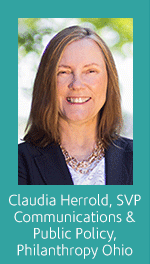 Philanthropy is shifting. It’s applying new practices and strategies addressing equity disparities and focusing on the future of philanthropy in Ohio – and that’s the focus of this year’s statewide convening, Philanthropy Forward ’17. Registration opened last week online for the conference we’re holding in Cleveland on October 4 – 6.
Philanthropy is shifting. It’s applying new practices and strategies addressing equity disparities and focusing on the future of philanthropy in Ohio – and that’s the focus of this year’s statewide convening, Philanthropy Forward ’17. Registration opened last week online for the conference we’re holding in Cleveland on October 4 – 6.
As always, the planning team has crafted three days of outstanding learning and connecting opportunities for the year’s largest gathering of Ohio philanthropic organizations and individuals.
Our plenary speakers will challenge you to think and act differently on big picture themes that have daily application to your work:
 Phil Buchanan, president of the Center for Effective Philanthropy, will headline the conference with his session Leading Effective Organizations in Complex, Changing Times. He’ll draw on recent CEP research (The Future of Foundation Philanthropy and other studies) to offer insights on the state of philanthropy. Small group discussion will let you react to the data and share your own experiences.
Phil Buchanan, president of the Center for Effective Philanthropy, will headline the conference with his session Leading Effective Organizations in Complex, Changing Times. He’ll draw on recent CEP research (The Future of Foundation Philanthropy and other studies) to offer insights on the state of philanthropy. Small group discussion will let you react to the data and share your own experiences.
Dr. Eddie S. Glaude, Jr. (chair, Center for African American Studies at Princeton University) will lead a conversation on The Value Gap: A Challenge to Equity, focused on philanthropy’s role in addressing equity and racial disparities. His latest book, Democracy in Black: How Race Still Enslaves the American Soul, provides the context for his discussion of the value gap that has left many behind socially and economically as well as the complexities, vulnerabilities and opportunities for hope.
Our third plenary speaker is Trista Harris, president of the Minnesota Council on Foundations, who will speak about the future of philanthropy as she explores trends and leads a panel discussion of Ohio philanthropy leaders who reflect on leading from where they are, strengthening the leadership pipeline, new skills for the constantly changing landscape and stepping fully into a place at the table.
The learning continues in our 20+ breakout sessions that cover a multitude of topics, including fundraising practices, early literacy, neighborhood instability, civic engagement, gender gaps, racial disparities and immigrant populations. The list goes on and on, with something for everyone at every level of experience.
 And, we know how much conference attendees value opportunities to network with colleagues they see once a year so we’ve planned lots of time for informal conversation. Meet up during designated networking breaks, dine-arounds, and the Welcome Party – Ohio Roots: Home Grown, a lively celebration at the Great Lakes Brewing Company Tasting Room.
And, we know how much conference attendees value opportunities to network with colleagues they see once a year so we’ve planned lots of time for informal conversation. Meet up during designated networking breaks, dine-arounds, and the Welcome Party – Ohio Roots: Home Grown, a lively celebration at the Great Lakes Brewing Company Tasting Room.
There’s also time to explore Cleveland during four learning tours:
- Why Parks Matter: Learn about the positive impact parks have on equity, health, property values and a sense of community as RAND and City Parks Alliance share recent research findings during a tour of public spaces and Cleveland’s neighborhood parks.
- Social Enterprise for Sustainable Growth: Tour several Cleveland social enterprise organizations to explore how philanthropy and social enterprise can collaborate to promote sustainable growth. Learn how funding can facilitate entrepreneurial growth as a component of an entrepreneurial ecosystem to increase regional prosperity.
- STOMP! Five Strategies for Professional Development: Experience the unique STOMP! System’s five self-guided strategies to assess, develop and fulfill your career ambitions. You’ll learn the top competitive-edge skills of extraordinary professionals, assess your current progress toward your career aspirations and learn to progress in your professional power.
- Playhouse Square: With five fully-restored historic theaters, Playhouse Square is the largest theater restoration project in the world. Today, Playhouse Square is the largest performing arts center outside of New York City and hosts nearly one million guests and one thousand curtains each year. Join colleagues on a tour to discover how these gems were saved from the wrecking ball.
All this and much more await you at the 2017 conference: find out more online and register today.
Claudia Y.W. Herrold















